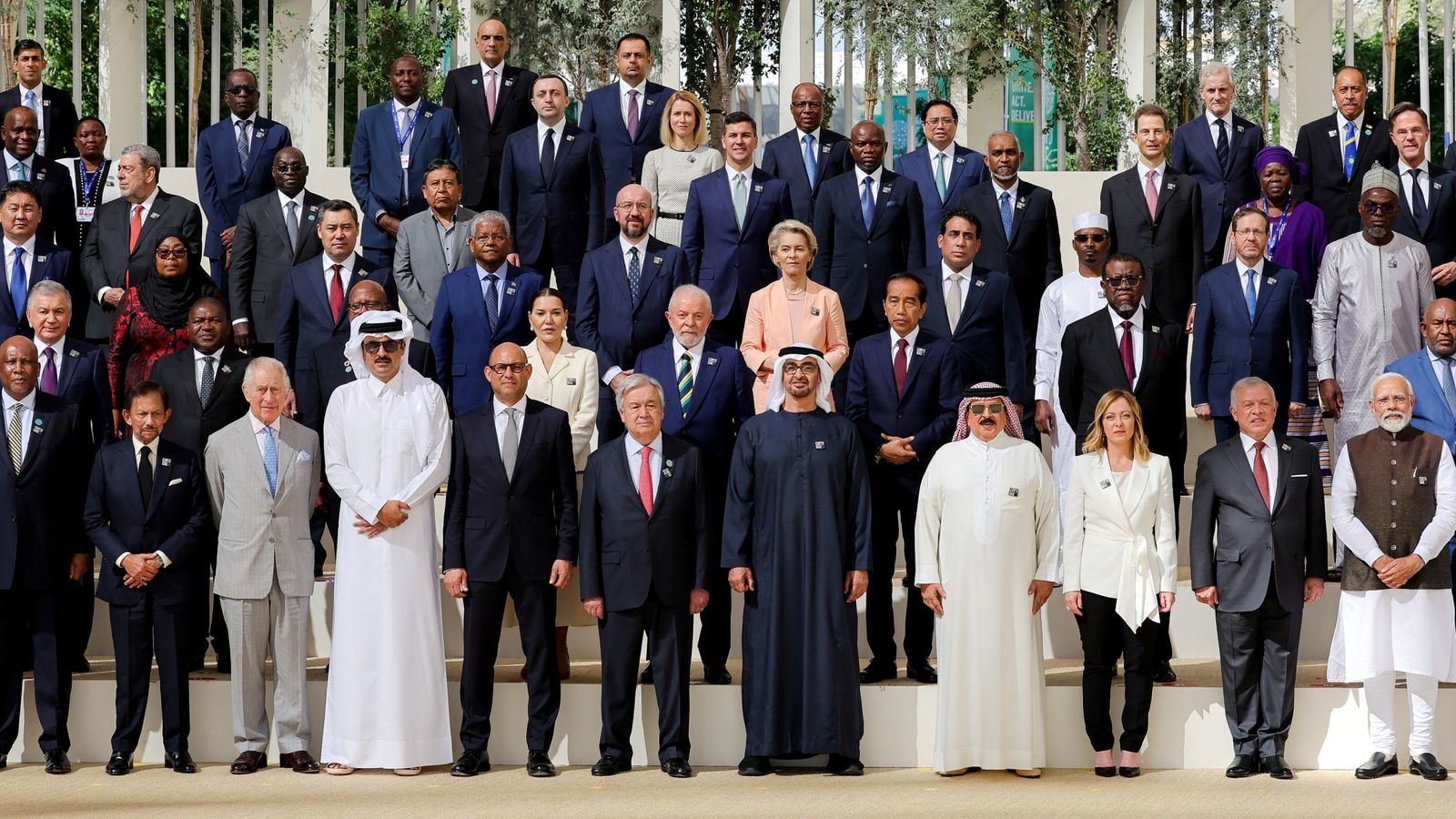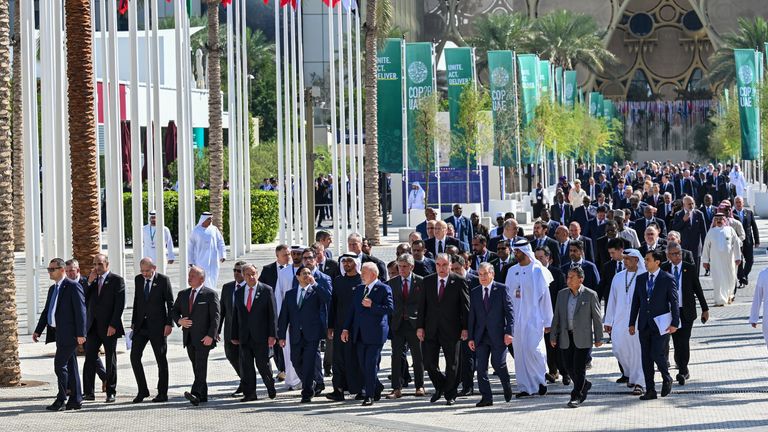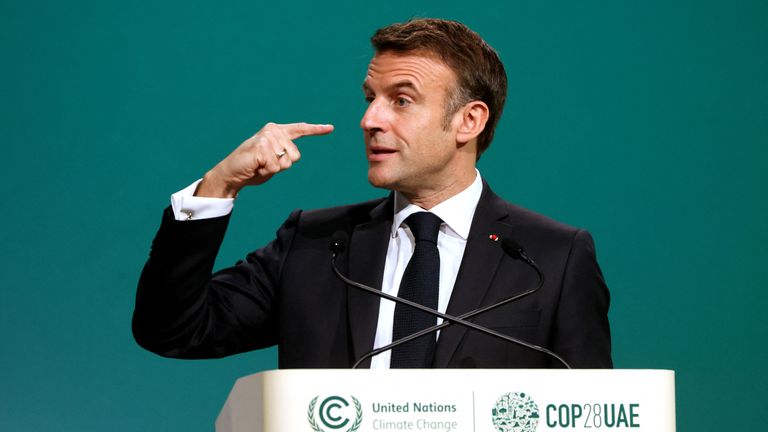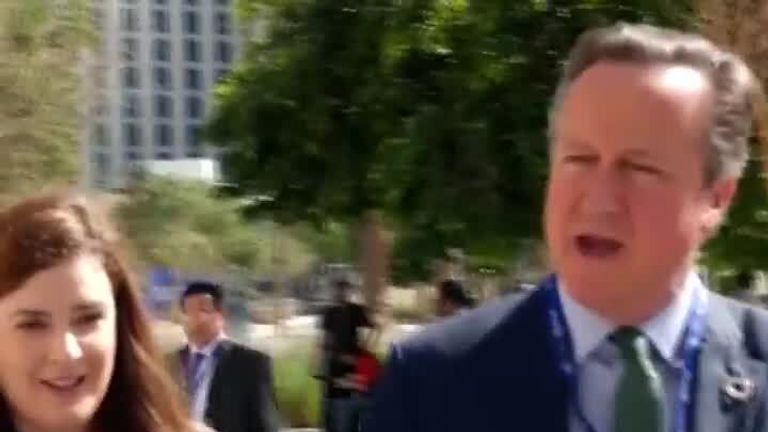For these two days every year, you feel like you’re in the centre of the world.
A natural world in a desperately sorry state.
But at the annual COP climate conference, you feel like you’re at the heart of power to change things.
During the first few days, when presidents and prime ministers jet in, you might just run into the Indian leader in the corridor.
Unfortunately, he didn’t want to talk.
The leaders had started their day with a “family photo” under the impressive dome at Dubai’s Expo City conference venue.
A small group of journalists were locked down in a high-security pen to capture them walking past.
Things fell strangely quiet, whereas usually COP is a noisy ruckus of people from almost 200 countries. Yet there is something unexpectedly underwhelming as you see these huge names are just people too.
At few other forums are you a stone’s throw from dozens of leaders – including Rishi Sunak, the King, Brazilian President Lula, French President Emmanuel Macron, all at the same time.
“It’s like Davos on steroids,” a former UK cabinet minister here told me, referring to the annual World Economic Forum meeting in January.
The sun was beating down, a reminder of the heat that migrant workers toil in here in the Gulf, and of the fact people are migrating because climate change is making their own homes unliveable. Talk about a global issue.
After the leaders had walked past, they filed into the main plenary hall to each deliver a speech roughly saying: one, they must do more, but, two, we in [insert country here] are doing our bit.
“We’ve got to work together,” said Rishi Sunak, adding the UK has “decarbonised faster than any other major economy”. But his recent attack on climate change has not gone down well on the world stage.
In spite of his recent war of words on climate action, he insisted on the way over here that he could “stand tall” at COP28 – but this is up for debate.
Hot air or real impact?
But does all this showboating achieve anything, or is it just a talk shop?
Well, it’s a bit of both. A lot of it is hot air, rehashing old commitments, saying the right thing, and enjoying the green PR boost.
But diplomats doing the hard graft here say the world leaders’ presence helps: it sends signals about how ambitious governments are willing to be – or not – and this lays down the gauntlet in the negotiating rooms.
They also announce extra cash or commitments that grease the wheels for a final deal.
The big story at COP28 is whether countries will finally even dare to utter the need for a “phase out of fossil fuels” in a treaty about climate change, despite fossil fuels being the number one cause of climate change.
We’ve had 27 COPs already, and the final agreement each year still hasn’t even mentioned “fossil fuels”. It wasn’t until COP26 in Glasgow that “coal” was mentioned in the final decision for the first time.
Now there is pressure to focus on all fossil fuels. But it is really hard for developing countries that are more dependent on them – like perhaps Nigeria or South Africa – to commit to ditching fossil fuels, because there still isn’t enough cash or other support to help them.
The entire continent of Africa, for example, is responsible for just 4% of emissions.
That’s why developing countries argue that countries like the UK that have the most to cause climate change, and have the greatest means to ditch fossil fuels, have to lead the way if they want somewhere like Ecuador to follow suit. That is how negotiations work.
Britain’s continued licensing of new oil and gas fields doesn’t help.
One small thing that might help here is the great food – freekeh salad today – small queues for coffee and slick organisation.
This sounds trivial, but people who were at COP21 say France’s excellent catering and well-planned breaks from negotiations helped get the historic Paris Agreement over the line.
Whereas the days when food and water ran out at COP27 in Egypt sent tensions soaring higher in negotiations – though Egypt did land an historic fund to help vulnerable nations recover from damages inflicted by climate change.
Examples like this show why COP forums really matter, say developing countries.
The so-called Loss and Damage Fund was 32 years in the making, many thought it would never happen, and helps poor countries cope with a problem they didn’t cause.
This year got off with a bang as host nation UAE announced the fund was up and running – sooner than had been expected.
But the real test will be whether countries commit in writing to some form of fossil fuel language, and enough action to achieve it.



